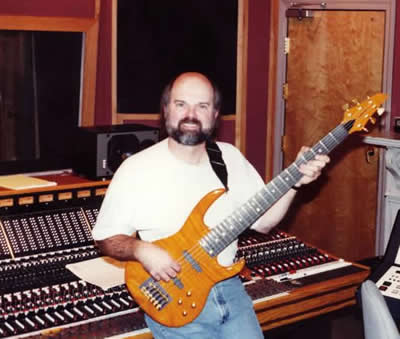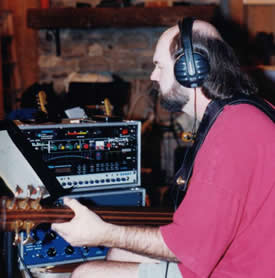Interview with A-List session bassist Mike Chapman

Mike Chapman has been an A-list session bass player in Nashville since the 1980s. He has recorded with Garth Brooks, Martina McBride, Trisha Yearwood, LeAnn Rimes, Brooks and Dunn, Huey Lewis, Hank Williams Junior, Kathy Mattea, George Jones, Ray Price, Keith Whitley, and countless others. Mike has played bass on over 30 number 1 singles and the albums that he has played on have sold over 150 million copies.
Born in Athens, Alabama, Mike grew up playing all kinds of music. As a teenager he played guitar in rock bands, country bands, and soul bands. By his mid twenties, after a few years of steady nightclub work, he landed a road gig with Hank Williams, Jr. After a short stint with Bocephus, Mike decided to pursue his dream of being a studio musician and moved to the Muscle Shoals area of Alabama. After successfully inserting himself into the world renowned studio scene there, he worked sessions regularly for the next five years and eventually began getting calls to come to Nashville to record. This prompted a permanent move to Music City where he has worked and lived ever since.
The following excerpts are from an interview I conducted with Mike in November, 2009. This interview in its entirety will appear in the book.
{Eric Normand} At what point of your career did you become interested in becoming a session player and what led you to this decision?
{Mike Chapman} After playing the Huntsville, AL nightclubs six nights a week for about seven years, I started getting really burned out. I had gotten to the point where I was making the top money in town and I looked around and there were only 2 or 3 musicians that were past 40 years old and still playing in clubs. I knew I wanted more out of life and music and so I started dreaming of getting out of the nightclubs and doing something different. I had always had a tremendous amount of respect for the guys who played on records…the recording musicians…to me that was the big leagues…the ultimate. Milton Sledge (a great friend and drummer, Milton and I went to school together and played in teenage bands together and later we both wound up playing in the same nightclubs in Huntsville) felt the same way and he and I started trying to figure out how we could get out of the nightclubs of Huntsville and into doing recording sessions in Muscle Shoals…which was only about 35 miles or so from where we lived.
{EN} I understand your career as a session player began in Muscle Shoals, Alabama. How did your first professional recording session come about?
{MC} As Milton and I were planning our escape from the Huntsville nightclubs…he got a nightclub job on the Tennessee state line, up above Muscle Shoals. There was a guitar player in that band who told Milton he had free access to a small recording studio that wasn’t being used much. He told Milton that he’d written some songs and asked if he’d be into playing drums on some demos of those tunes…for no money…just for fun. Milton jumped at the chance to get some studio experience. The next thing the guy asked Milton was if he knew anyone that was a good bass player who’d like to do the same thing and Milton told him about me.
{EN} What was it like to work in Muscle Shoals as a session player during the time period you were there?
{MC} Well…because it was all new to me and it was the start of what I hoped was a way out of the clubs…it was very exciting. But…the thing I didn’t realize at first was that the recording business in Muscle Shoals was actually very slow at that time and because of that, some of the studio musicians had moved to Nashville to pursue work. That was good and bad for us. Because some musicians were gone, it left room for Milton and I to come in and start doing some work…the bad part was there just wasn’t a lot of work to be done. Even though in the 60s and 70s Muscle Shoals was a busy place for recording pop and r&b, by the early 80’s artists had almost completely quit coming to there to record. There were very few master sessions being recorded and when they were it was either at Muscle Shoals Sound (who had their own in-house band of fantastic musicians…The Swampers…who were the owners of the studio) or it was at FAME studios and producer/studio owner Rick Hall would call studio musicians from Nashville to play.
Milton and I were learning to work in the studios doing mostly songwriter demos and playing a lot of great pop and r&b with great musicians and singers and loving every minute of it. A couple of songwriters in Muscle Shoals had gotten some Alabama cuts (at that time, the group Alabama was the hottest thing in country music) and had a big hit single and so there started to be a lot of focus on Muscle Shoals songwriters trying to get their songs cut by artists in Nashville. People who had always primarily written pop and r&b began wanting to cut country music demos. There were country songs being written and there were pop and r&b songs being re-done with country style demos. The fact that Milton and I had experience playing country music, understood it and liked it…was a factor in our getting called for a lot of country music demos.
{EN} After a few years of working in Muscle Shoals, you began to get calls to come to Nashville and record. What prompted those initial calls?
{MC} After working with several great songwriters in Muscle Shoals, a couple of them (Donny Lowery and Russell Smith) signed publishing deals with big companies in Nashville. The publishing companies liked the sounds the writers had been getting on their demos in Muscle Shoals and told the writers to call their Muscle Shoals musicians to play on demos of their new songs in Nashville. Donny and Russell started bringing Milton and I and some other guys to Nashville to record. So, we starting driving to Nashville to do sessions…about 2 ½ hours each way. The last year I lived in Muscle Shoals, I actually made more money in the studios of Nashville than in the studios of Muscle Shoals and that told me it was time to move.
{EN} Tell me about your first sessions in Nashville.
{MC} I loved it. It was fun recording with new people in new rooms, meeting new engineers, new songwriters, artists, musicians and learning new ways of doing things. It seemed like every time I did a session and met new people it led to more work. The musicians were awesome. It was a thrill getting to know and getting to play with guys that were legends to an album credit reader like me.
…… More with Mike later…..